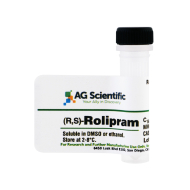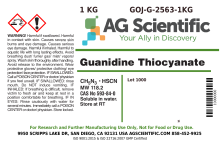Vitamin C
50-81-7
176.1
C6H8O6
Water
Room Temperature
L-Ascorbic acid, as known as Vitamin C, is water-soluble antioxidant. It works as an electron donor carrying a neutral charge and is unstable and hydrophilic.
The acid is synthesized in some plants and some animals especially except for humans, which have to consume it in their diet to prevent scurvy. In some animals able to produce L-Ascorbic acid, the acid is synthesized by enzymes in the liver.
Vitamin C protects plants from oxidative stress and mammals from various chronic diseases, such as cancers, cardiovascular diseases, aging and cataract, originated by oxidative stress. In addition, it prevents cells from damages caused by radiation.
Applications:
• Antioxidant reagent
• Electron donor
• Used in collagen synthesis
• Cell differentiation
0.1 lbs
Research or further manufacturing use only, not for food or drug use.



